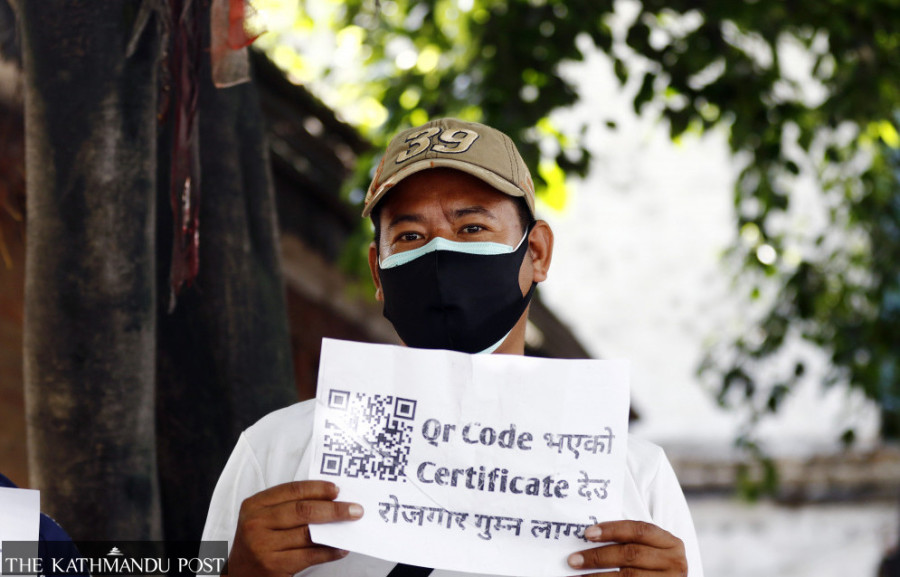National
Government starts accepting applications from migrant workers for QR-coded jab certificates
Foreign job seekers will be issued certificates within a few days of filing an application, which can be done online or in person.
Chandan Kumar Mandal
After over two weeks of desperate wait and struggle in Kathmandu, Baburam Gurung heaved a sigh of relief on Wednesday afternoon.
Gurung is among the hundreds of Nepali outbound workers who have been struggling for vaccination certificates with Quick Response (QR) codes, which have been made mandatory by labour destination countries.
Gurung, 38, got vaccinated on July 19, the day the government started administering the Johnson & Johnson vaccine, received from the US under the COVAX facility.
Vaccination is a necessary condition for foreign workers like Gurung for visiting the labour destination countries in the Persian Gulf. Gurung works as a driver in Kuwait.
But for two days after getting vaccinated, he had to run here and there for a vaccination card verified by a Health Ministry-mandated hospital and its re-verification by the Department of Consular Services of the Ministry of Foreign Affairs.
“No one can imagine the pain and struggle we have been through over the last two weeks,” Gurung, originally from Basundhara, Kathmandu, told the Post on Thursday afternoon. “But then we learnt that all that hard work was in vain as our vaccination document did not have QR codes as asked by the Kuwaiti authorities. As a result, the verified vaccination certificates were virtually of no use.”
The good news finally for Gurung and hundreds of workers like him came on Wednesday afternoon after the Health Ministry published a notice saying it would issue vaccination certificates with QR codes to outbound migrant workers.
The Health Ministry said outbound migrant workers can submit applications online along with required documents for QR coded-vaccination certificates. Besides, those who are unable to apply online can submit their applications at the National Ayurveda Research and Training Centre at Kirtipur, the notice says.
“Despite all the hardship we went through, I am happy that they are finally issuing the QR-coded certificates,” said Gurung. “It is even easier as the applications can be submitted online.”
But Gurung submitted his application by visiting the Ayurveda training center at Kirtipur on Thursday to avoid possible online glitch after his online application was not accepted in the first attempt on Wednesday.
“Around 70 workers, who have been waiting for QR-coded vaccination certificates for more than two weeks, also submitted their applications physically at Kirtipur instead of applying online. There were hundreds of workers like me.”
While submitting an online application, a service seeker has to submit a scanned copy of passport, a passport-size photo, a copy of vaccination card and a declaration form confirming that the person has been fully vaccinated for Covid-19.
Likewise, those wishing to submit their applications physically should visit the Ayurveda training centre at Kirtipur with an original passport, original vaccination card, a passport-size photo, photocopies of passport and vaccination card as well as a declaration from, which can be downloaded from the website.
Service seeker migrant workers say submission of the declaration form, which requires the applicant’s thumbprints, has made the online application process complicated for them.
“For workers like me who are not in the Kathmandu Valley at present, online application is convenient as one does not need to travel to Kathmandu for the document,” Yunush Malla, a Kuwait-bound migrant worker, told the Post from Chitwan. “But the declaration form makes things slightly difficult for those who are not educated or are not technology savvy. One has to go to the website, download the form, print it, fill it up with all the details including thumbprints and again upload it on the website.”
Workers like Gurung, who visited the centre on Thursday, had faced the same issues.
They had downloaded the form and made copies of the declaration form and shared among each other. “There was confusion among workers as some of them were wrongly uploading the declaration forms. Kuwait-bound workers like our group did not have to stand in long queues as we were given priority over others,” said Gurung. “However, online applications can be difficult for migrant workers who are not tech-friendly. This could be one of the reasons why a large number of workers had reached Kirtipur.”
But even after filing their applications the migrant workers will have to wait for some more days for their QR-coded vaccination certificates. They have been told that they would be provided the document online in a couple of days.
Although their weeks of struggle for the document appears to be finally over, they complained that the government put them through all the hassles for nothing.
According to Malla, only if the government had made the online arrangement earlier, they would not have to go through the hardships.
Gurung echoes Malla.
“Only after we came out protesting, the government responded to our demands,” Gurung said.




 22.64°C Kathmandu
22.64°C Kathmandu












